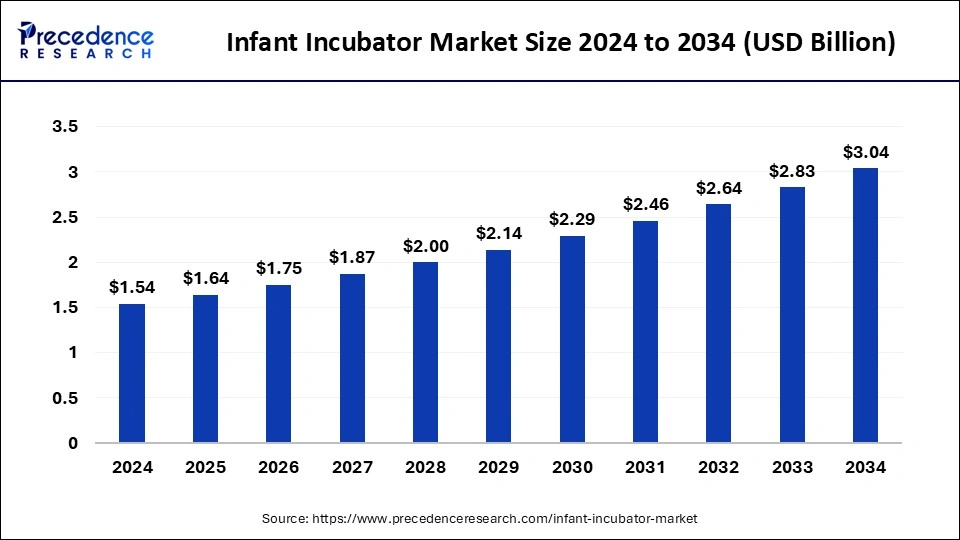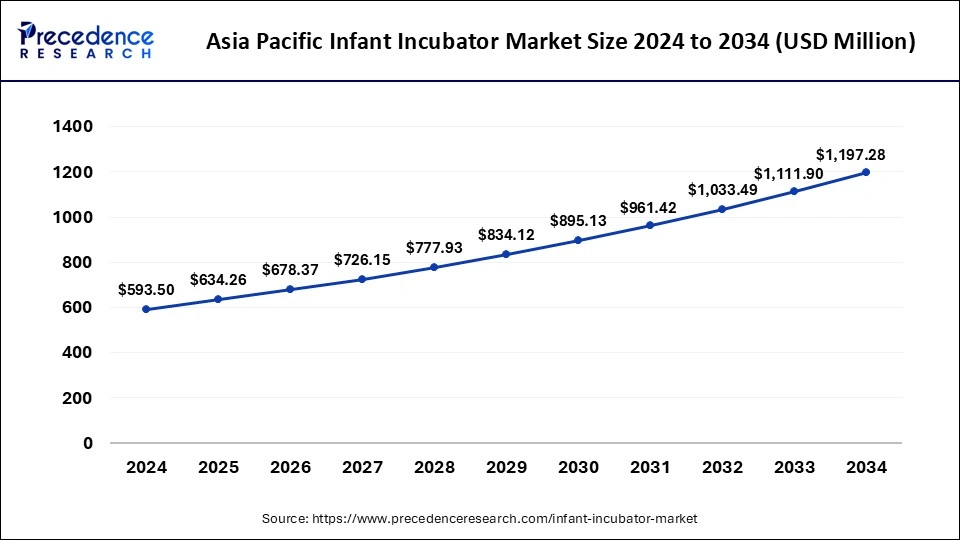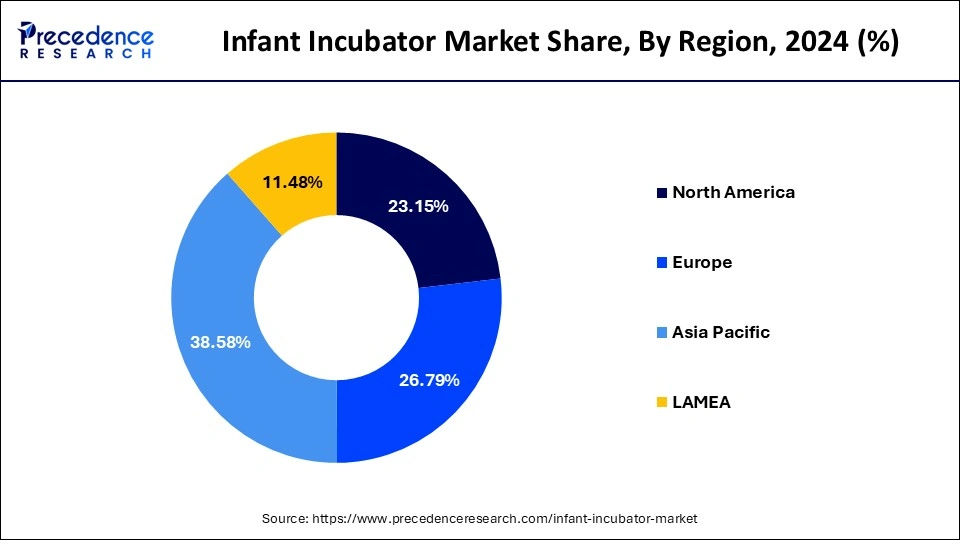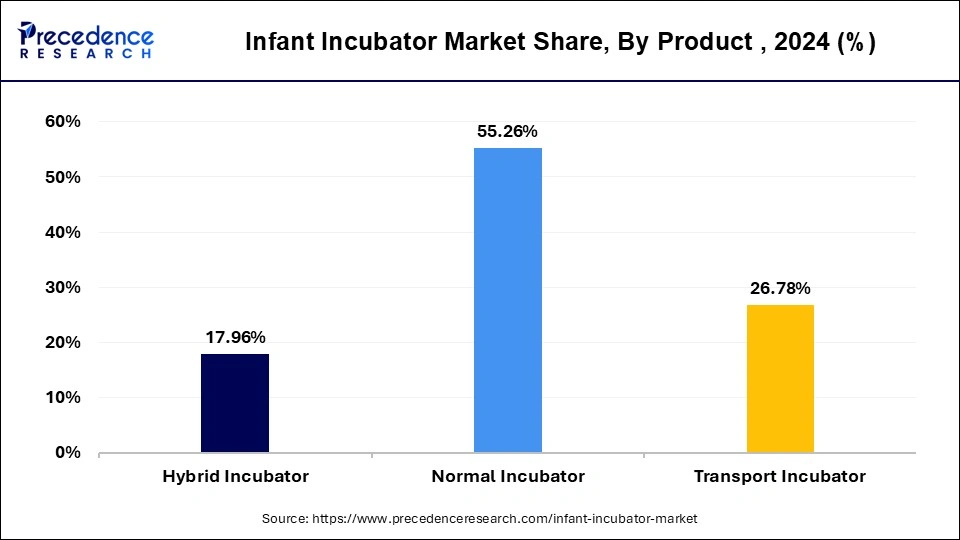Infant Incubator Market Size and Forecast 2025 to 2034
The global infant incubator market size accounted for USD 1.54 billion in 2024 and is predicted to increase from USD 1.64 billion in 2025 to approximately USD 3.04 billion by 2034, expanding at a CAGR of 7.10% from 2025 to 2034.

Infant Incubator Market Key Takeaways
- Asia Pacific held a market share of 38.58% in 2024.
- By product, the normal incubator segment registered a maximum market share of 55.26% in 2024.
- By application, the neonatal hypothermia & low birth weight segment is expected to capture the biggest revenue share of 55.74% in 2024.
What is the role of AI in the Infant Incubator Market?
Artificial Intelligence (AI) applications used in neonatology include tools for vital signs monitoring, disease prediction, and risk assessment. An AI-based smart infant care and monitoring incubator, which is equipped with sensors to monitor vital signs like heart rate and oxygen levels, and also environmental factors like air quality, temperature, and humidity, using IoT connectivity. The system provides real-time data to caregivers via a mobile app or web platform, allowing remote monitoring and timely interventions.
AI offers many benefits, including improved user experiences, enhanced decision-making, increased efficiency, and the potential to solve complex problems. It personalizes interactions, automates tasks, and analyzes data. It also includes benefits like innovation, cost reduction, availability, advanced data analysis, increased efficiency, automation, and enhanced customer experience.
Asia Pacific Infant Incubator Market Size and Growth 2025 to 2034
The Asia Pacific animation market size was exhibited at USD 593.50 million in 2024 and is projected to be worth around USD 1,197.28 million by 2034, growing at a CAGR of 7.30% from 2025 to 2034.

North America is anticipated to dominate the global infant incubator market between 2025 and 2034. Infant incubators are necessary for nations with dense populations due to the rise in preterm birth rates. Furthermore, technological advances in the neonatal care sector, including developing cutting-edge incubators such as double-walled incubators, microprocessor-based servo-controlled temperature systems, and incubators with thermal-neutral environments, aided market growth.
Europe is projected to grow due to various benefits that promote newborn health. The infant incubator industry is being driven by advancements in neonatal care, an increase in the birth rate of premature babies, and increased awareness. Furthermore, the increased number of NICU unit installations drives market growth over the projected period. Baby incubators improved premature baby survival and reduced neonatal hypothermia.

Asia Pacific dominated the global infant incubator market in 2024.
- In May 2022, the newest range of approved Neonatal Ambulances was specially developed for the Government of Maharashtra and was introduced by Pinnacle Industries. These ambulances are equipped with all necessary medical facilities & advanced technologies. The company has announced that it has delivered 5 Neonatal Ambulances to the Government of Maharashtra today to provide advanced Life support to the neonates.
New range of Neonatal Ambulances introduced by Pinnacle Industries - Healthcare Radius
North America is projected to host the fastest-growing market in the coming years.
- In April 2021, an incubator for the Institute for Healthcare for children and youth of Vojvodina was delivered by UNICEF. For ‘little giants', four incubators in three towns in one day.
UNICEF delivered an incubator to the Institute for Health Care of Children and Youth of Vojvodina
Market Trends
- Increasing investment in pediatric care
- Expanding healthcare infrastructure
- Technological advancement in incubator design
- Rising neonatal care awareness
Market Overview
The infant incubators market is growing due to rising concerns about newborn health, an increase in the occurrence of chronic infections and a number of infants dying suddenly and unexpectedly in hospitals. According to the World Health Organization (WHO), an estimated 15 million premature babies are born yearly, more than one in every ten babies. Each year, approximately 1 million children die from preterm birth complications.
Many surviving babies are disabled for the rest of their lives, including learning disabilities and visual hearing impairments. Furthermore, the occurrence of numerous epidemics, as well as the looming health consequences they pose, has increased the requirement for intensive care incubators across healthcare facilities, promoting market growth. Moreover, the increasing acceptance of newborn incubators by several end users, such as hospitals and pediatric and neonatal intensive care units, will drive the market forward in the coming years.
The healthcare industry has emphasized the benefits of government bodies cooperating to advance healthcare facilities in the United States.
Market Scope
| Report Coverage | Details |
| Market Size in 2025 | USD 1.64 Billion |
| Market Size by 2034 | USD 3.04 Billion |
| Growth Rate from 2025 to 2034 | CAGR of 7.10% |
| Base Year | 2024 |
| Forecast Period | 2025 to 2034 |
| Segments Covered | Product, Application, and End User |
| Regions Covered | North America, Europe, Asia-Pacific, Latin America, and Middle East & Africa |
Market Dynamics
Drivers
New incubators with top adjustment elements are now available
Due to various ongoing advances in neonatal care, premature infants have greater access to medical therapy than before. If the newborn requires surgery, preserving them in an incubator increases their probability of recovery because the equipment allows medical experts to prepare them in the best possible environment. Furthermore, as innovative technologies such as using webcams in NICUs allowed families to connect with their infants, this advancement has resulted in visible positive therapy outcomes in hospitals and enhanced patient satisfaction.
For instance, the Fluke Biomedical INCU II is a complete incubator/radiant warmer analyzer that, by adhering to global standards, simplifies testing while guaranteeing the proper operation and security of transport incubators, infant incubators, and as radiant warmers.
Restraints
Loud noises produced by premature infant incubators may lead to hearing loss
Newborn incubators play a significant role in the healthcare sector to provide better healthcare services. Despite their dominance, incubators have limited drawbacks. The neonatal intensive care unit (NICU) requires radiant warmers and incubators to offer a thermo-neutral surroundings for preterm infants. Various hospitals in middle-income and low-income countries cannot afford the high maintenance and capital costs of presently available thermoregulation gadgets, so affordable, high-quality equipment is needed.
Furthermore, preterm infants necessitate specific care and must spend days, if not months, in neonatal units equipped with monitoring devices and incubators to help control their cardiorespiratory and temperature function. Such devices produce noise from switches, fans, and alarms. Environmental noise has been associated with a greater risk of brain development issues and disrupting activities such as recreation and sleep. The abovementioned factors may cause a decline in infant incubator demand over the following decade.
Opportunities
The use of neonatal intensive care units is increasing.
The natality of underweight babies and other baby abnormalities is the primary driver of market expansion. The increasing use of neonatal intensive care units for premature babies further improves the market.
According to the National Library of Medicine, 39 220 infants (12.4%) were admitted to the NICU among the live births, resulting in a mean of 1.46 NICU patient days per birth. High GA and BW newborns reported 96% of births (307 417), admission in NICU is 69% (26 918), and 25% (118 027) of NICU patient days.
Product Insights
The transport infant incubator segment underwent notable growth in the market during 2024.
- In February 2025, the neonatal ICU Ambulance was inaugurated by SP. This special ambulance, the first of its kind in Rayalaseema, will allow safe transport of critically ill newborns from any remote location.
https://www.thehansindia.com/andhra-pradesh/sp-inaugurates-neonatal-icu-ambulance-947988
The intensive care incubator segment will gain a significant share of the market over the studied period of 2025 to 2034.
- In July 2025, at the historic 174-year-old Government Lady Goschen Hospital in Mangaluru was launched a state-of-the-art Obstetric Critical Care Unit (OCCU). With more than 6000 deliveries annually, this facility is aimed at drastically reducing maternal and infant mortality rates during childbirth.
https://www.daijiworld.com/news/newsDisplay?newsID=1284403

Infant Incubator Market, By Product, 2022-2024 (USD Million)
| By Product | 2022 | 2023 | 2024 |
| Hybrid Incubator | 244.42 | 259.75 | 276.26 |
| Normal Incubator | 755.12 | 800.86 | 850.05 |
| Transport Incubator | 356.00 | 382.82 | 411.93 |
End-User Insights
The hospitals segment maintained a leading position in the market in 2024.
- In September 2024, the first of its kind study that could significantly impact clinical care for opioid exposed infants at risk for developmental delays was launched by the Research team.
The pediatric and neonatal intensive care unit segment is predicted to witness significant growth in the market over the forecast period.
- In July 2025, an advanced NICU facility for women and child care was launched by Medicover Hospital. The new unit offers integrated antenatal to postnatal care, with round-the-clock neonatal and pediatric critical care support.
Medicover Hospital launches advanced NICU facility for women and child care - Express Healthcare
Application Insights
The neonatal hypothermia segment enjoyed a prominent position in the market during 2024.
- In November 2022, new gadgets for newborn care were launched by GenWorks. The digital medical and healthcare solution provider has developed a series of high-tech machines and devices for newborn care.
GenWorks launches new gadgets for newborn care - Healthcare Radius
The lower birth weight segment is projected to expand rapidly in the market in the coming years.
Infant Incubator Market Revenue, By Application, 2022-2024 (USD Million)
| By Application | 2022 | 2023 | 2024 |
| Neonatal Hypothermia & Low Birth Weight | 754.12 | 804.62 | 804.62 |
| Jaundice | 417.06 | 443.66 | 443.66 |
| Others | 184.35 | 195.14 | 195.14 |
Recent Developments
- In September 2023, to improve ambulance services for newborns in Bengaluru, Tele-NICU was launched. The ambulance will be equipped with essential services like infant incubators, heart and lung monitors, high-frequency and conventional ventilators, blanket warmers, etc.
Tele-NICU launched to improve ambulance services for newborns in Bengaluru
- In June 2023, S.Korea's first homegrown hybrid incubator was launched by JW Pharma. The models from the company's Hi-Mammi brand have entered a domestic market dominated by imports. The company's rollout of hybrid and high-end, and low-end models was its first product launch since acquiring the medical device unit of affiliate JW Bioscience in January.
JW Pharma unveils S.Korea's first homegrown hybrid incubator - KED Global
Infant Incubator Market Companies
- GE Healthcare
- Inspiration Healthcare Group plc.
- Natus Medical Incorporated.
- Koninklijke Philips N.V.
- Fisher & Paykel Healthcare
- International Biomedical Ltd.
- Drägerwerk AG & Co. KGaA
- Atom Medical Corporation
- Novos Medical Systems
- Fanem Ltda
- Pluss Advanced Technologies Pvt. Ltd.
- Weyer GmbH
- Medical Technology Transfer and Services in Asia
- BabyBloom Healthcare BV
Segments Covered in the Report
By Product
- Hybrid Incubator
- Normal Incubator
- Transport Incubator
By Application
- Neonatal Hypothermia & Low Birth Weight
- Jaundice
- Others
By End User
- Hospitals
- Maternity & Pediatric Hospitals
- Others
ByGeography
- North America
- Europe
- Asia-Pacific
- Latin America
- The Middle East and Africa
For inquiries regarding discounts, bulk purchases, or customization requests, please contact us at sales@precedenceresearch.com
Frequently Asked Questions
Ask For Sample
No cookie-cutter, only authentic analysis – take the 1st step to become a Precedence Research client
 Get a Sample
Get a Sample
 Table Of Content
Table Of Content
 sales@precedenceresearch.com
sales@precedenceresearch.com
 +1 804-441-9344
+1 804-441-9344
 Schedule a Meeting
Schedule a Meeting